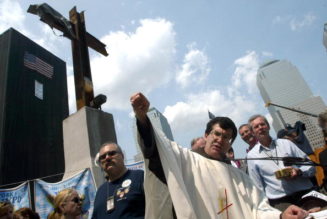
In 1969, the United States bishops created the Catholic Campaign for Human Development (CCHD). Its mission is to fund programs that address “systems and structures” of injustice and poverty in America. Unfortunately, over the years many CCHD programs have not upheld basic principles of Catholic social teaching. The CCHD has also used its money to fund left-wing political groups and support community organizing programs.
The U.S. Conference of Catholic Bishops recently met for a general assembly, where they held a closed-door, confidential discussion about the future of the CCHD. This was prompted largely by the CCHD’s desperate financial situation: It ran a deficit of $5.7 million dollars in 2022. The 2023 numbers are not available. The bishops also wanted to assess whether CCHD is effective—that is, a good use of the generosity of the faithful, who fund the organization. Is CCHD money serving the poor while upholding Church teaching? And is it serving the poor effectively?
Care for the poor is a moral obligation for Catholics. This is not open to debate. As Archbishop Chaput once said, “If we ignore the poor, we will go to hell.” Yet how we most effectively care for the poor is open to debate, and it is fitting that the bishops of the United States periodically examine whether a particular use of limited resources is the best or even an adequate approach—especially since CCHD’s resources come from the faithful in the pews.
After the assembly, detailed information on the bishops’ private discussions about CCHD was leaked to the National Catholic Reporter, which ran a piece criticizing the bishops’ discussion and suggesting that to question CCHD is to be against the poor. This is not a serious critique. Those who genuinely want to support the poor should have no problem with a rigorous discussion about the merits of CCHD and the work it supports. Stated intentions to serve the poor do not on their own feed, house, evangelize, or otherwise serve the poor.
I used to work for the USCCB. During my time there, I noticed a general fear around CCHD. To question it was a sure way to be labeled as inauthentically Catholic, so it was largely left alone. And when outside voices challenged it, the wagons circled, and the critics were largely dismissed as “anti-bishop.” This sort of self-protection has not served the bishops well over the years and, in this case, has perhaps not served the poor well either.
I, for one, will not give to the CCHD collection. I do not want my tithes to fund community organizing through partisan organizations—rather, I want my money to directly help those in poverty. Diocesan Catholic Charities and Catholic Relief Services are two programs that I generally support. Both genuinely serve the poor.
Other programs, like Christ in the City and A Simple House, serve the poor with a Catholic sensibility without getting caught up in political machinations that can undermine the moral credibility of an apostolate. Of course, the Missionaries of Charity and the Little Sisters of the Poor are other prominent examples. These sorts of apostolates provide not just material assistance but also spiritual support, which should be the ultimate end of any Catholic apostolate. Having a job is important, but getting to heaven should also be a priority for any Catholic mission to the poor, and yet the programs funded by CCHD commonly lack the eschatological dimension.
I was happy to see Bishop Thomas Paprocki speak about CCHD in his most recent diocesan column. He argues that the CCHD is using the faithful’s money for programs that have shown little success in alleviating poverty and that come with the potential of causing genuine scandal. He also believes that making Catholic education available to more poor families would be a better and more effective campaign against poverty. He proposes that the American bishops sunset CCHD and replace it with a National Campaign for Catholic Education. I do not know if this is the best approach, but it is something to consider, especially since we know education is one of the most effective paths out of poverty and that parental choice in education is a significant piece in the mosaic of social justice. In fact, I suspect there would be many more Catholics willing to contribute to such a fund than to CCHD as it currently exists.
What anti-poverty programs the bishops support is also a question of the bishops’ credibility. Rather than spending millions of dollars for programs that raise questions about the integrity of the bishops, why not direct that money to apostolates and services that clearly witness to the Gospel?
The bishops need to be transparent with one another (which is only possible if they don’t violate the confidential nature of their closed-door meetings) and the faithful regarding the allocation of limited resources, especially when it comes to spending hundreds of millions of dollars of the faithful’s money. The fact that several bishops violated the rules of the USCCB’s executive session by leaking information to the National Catholic Reporter has providentially opened a public conversation about how to make decisions about key episcopal programs.
Because CCHD functions in perpetuity unless the bishops affirmatively act otherwise, tens or hundreds of millions of dollars more of the faithful’s money will be spent on programs that have arguably not been effective in addressing poverty. We need a public conversation among the bishops about the Catholic Campaign for Human Development and whether it is a good use of money in service to the poor. If it is, then such discussions will hopefully make the program even more effective, and supporters have nothing to fear from this public conversation. If it is not, then it is time to consider other ways to fight poverty. Continuing without any debate, however, seems irresponsible at best, especially to the poor.
There is a moral obligation for bishops to be good stewards of the Church’s treasury. Whether supporting CCHD is good stewardship is a question that the bishops have not seriously considered for far too long. Now is the time.
Jayd Henricks is the president of Catholic Laity and Clergy for Renewal.
Image by w_lemay, licensed via Creative Commons. Image cropped.
Your charitable support for First Things is urgently needed before the clock above hits zero.
First Things is proud to be a reader-supported enterprise, and the Spring Campaign is one of only two major reader giving drives each year. It ends on June 30 at 11:59 p.m.
Your gift will fortify First Things to speak boldly on behalf of religious voices in the public square ahead of a pivotal season for our nation and the church.
Please give now.






